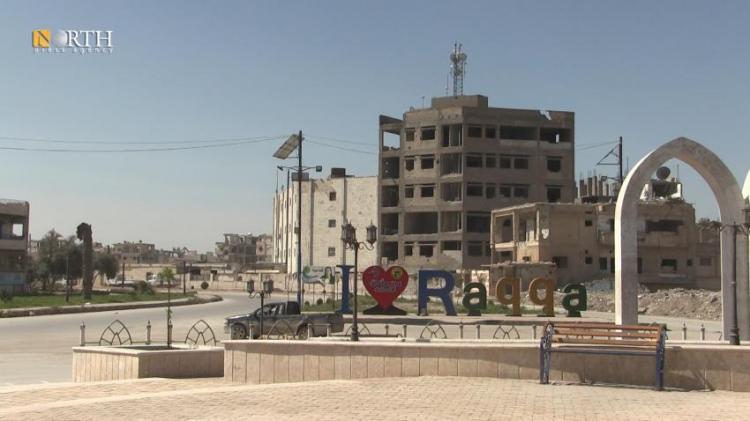RAQQA, Syria (North Press) – Following recent warnings by the World Health Organization (WHO) of the possibility of the return of coronavirus after the precautionary measures were lifted and life returned to normal in most countries, the Autonomous Administration of North and East Syria is preparing to enact a new set of measures to confront the possibility of the virus spreading again, which will be come into force in August.
A large portion of the population in the region is concerned that any new measures will lead to a ban, which could in turn lead to the suspension of their businesses again for long periods, which will further increase the deterioration of the living situation that recently declined among families with low incomes, on the background of the continued collapse of the Syrian pound against the dollar.
“Even hospitals and prisons”
Dr. Eid Jabr, Vice President of the Health Board in the Autonomous Administration told North Press that the new measures will cover all sectors of life, including hospitals, clinics, municipalities, and even prisons.
"It is a set of decisions and implementing regulations, such as equipping a medical laboratory and quarantine centers with a capacity of 1,000 beds distributed in the regions of North and East Syria," he added.
According to Jabr, quarantine centers which were equipped by Autonomous Administration are divided into three sections according to the degree of infection with coronavirus that may vary from person to another.
Earlier, on April 29th, the Health Board of the Autonomous Administration of North and East Syria announced two new cases of infection with coronavirus, though the cases recovered.
Lockdown "in a different mechanism"
The Health Board official indicated that the ban on movement and lockdowns would be reinstated, but with a mechanism different from the one took place from March 23rd to June 16th this year.
In general, despite the exceptions mentioned in the previous decisions, they had "negative repercussions" on some groups in the region, especially on those who suffer from limited employment opportunities.
Closed crossings
Dr. Jabr acknowledged that "the previous embargo measures were confusing to public and private sector institutions, in addition to its reflection on all aspects of life in northeastern Syria. At this stage the Administration is seeking new decisions that do not affect people’s daily lives in its usual form."
Regarding the closure of border crossings, Dr. Jabr said, "The decision has been followed consistently, and may reach the point of complete closure."
Reduced media coverage
Autonomous Administration media official Hashem Ahmad called on media outlets operating in northeastern Syria to again shed light on the dangers of coronavirus and how to prevent it.
He pointed out that the media played an instrumental role in raising awareness through the intensification of its reports and news, and what it covered in press articles regarding the dangers of the spread of coronavirus. However, after the lifting of the ban on June 16th, the press stopped focusing on the risks of the virus returning to the region.
Local reports indicate that residents’ adherence to the procedures of physical distancing during the curfew imposed by the Autonomous Administration “was acceptable” despite the occurrence of some repeated violations, but once the ban was lifted, “things returned to normal as if nothing happened.”
Currently, the return of congestion in the markets of northeastern Syria is noticeable, without observing general safety standards or physical distancing that health institutions in the region call for.
The absence of international aid
Daham Sattam from the "Create Path" Foundation, a civil non-governmental organization working in the city of Raqqa, described the work of civil society organizations during the lockdown as "weak", because they "did not receive sufficient support" to confront coronavirus appropriately.
He said that the organizations' work was limited to awareness campaigns, distribution of brochures, holding of seminars, lectures, and distribution of masks and sanitizers, as they were launched from individual initiatives.
At a time when civil organizations and health institutions in northeastern Syria are calling for support for the health sector, and warning of the possibility of a humanitarian catastrophe in the event of a new wave of spreading of corona pandemic, the Yaroubiya / Tel Kocher crossing, which was used by the United Nations to deliver aid to northeastern Syria, is still closed due to Russian-Chinese objections since late last year.
Sattam calls on international organizations and donors to provide the necessary support to the Autonomous Administration and civil society organizations to prevent the return of coronavirus to the region again.
Earlier, in May, the Autonomous Administration said during a press conference in Qamishli that the parties which promised them to provide medical assistance had not fulfilled their promises, while the Kurdistan Regional Government of Iraq (KRG) "is the only one who provided assistance."
It is worth mentioning that Syrian Ministry of Health stated that 16 new cases of coronavirus infection were recorded among individuals who came in contact with the infected, bringing the total number of recorded infections to 328. Meanwhile, it announced the death of ten people due to coronavirus and the recovery of 123.
Furthermore, the Autonomous Administration of North and East Syria announced the recovery of the only two recorded cases of infection with coronavirus.
(reporting by Mustafa Khalil, editing by Lucas Chapman)

